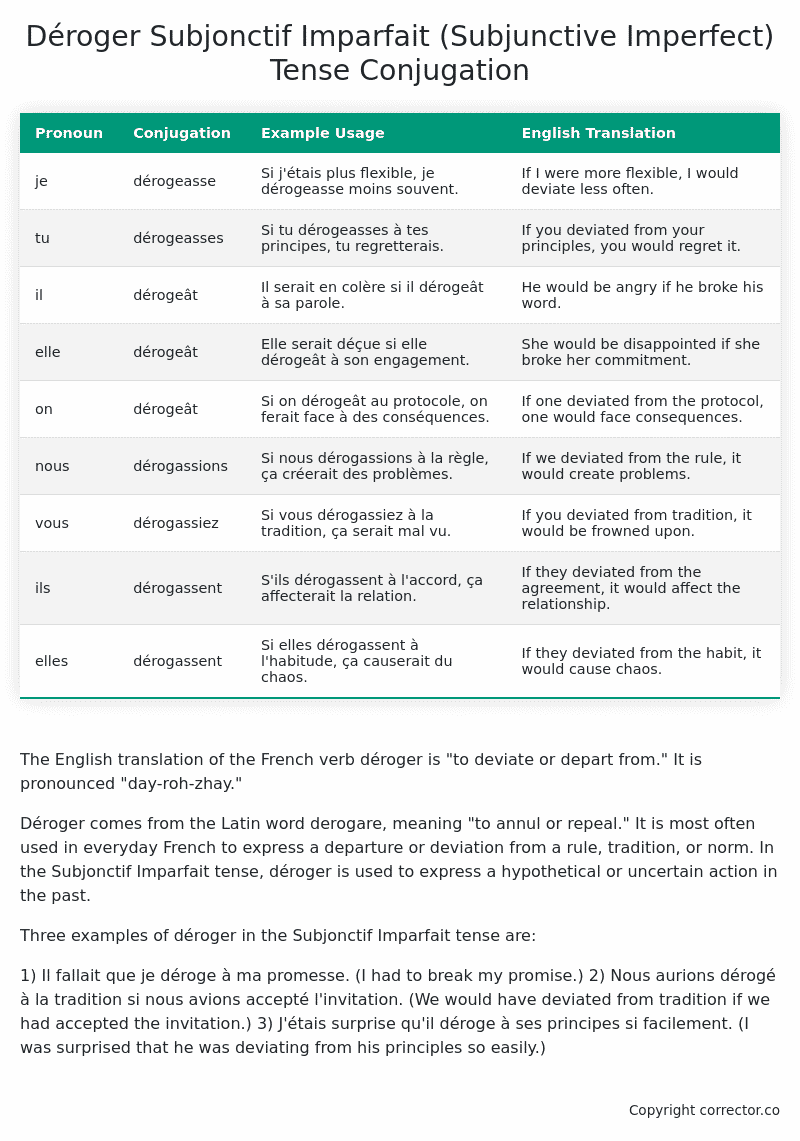Subjonctif Imparfait (Subjunctive Imperfect) Tense Conjugation of the French Verb déroger
Introduction to the verb déroger
The English translation of the French verb déroger is “to deviate or depart from.” It is pronounced “day-roh-zhay.”
Déroger comes from the Latin word derogare, meaning “to annul or repeal.” It is most often used in everyday French to express a departure or deviation from a rule, tradition, or norm. In the Subjonctif Imparfait tense, déroger is used to express a hypothetical or uncertain action in the past.
Three examples of déroger in the Subjonctif Imparfait tense are:
1) Il fallait que je déroge à ma promesse. (I had to break my promise.)
2) Nous aurions dérogé à la tradition si nous avions accepté l’invitation. (We would have deviated from tradition if we had accepted the invitation.)
3) J’étais surprise qu’il déroge à ses principes si facilement. (I was surprised that he was deviating from his principles so easily.)
Table of the Subjonctif Imparfait (Subjunctive Imperfect) Tense Conjugation of déroger
| Pronoun | Conjugation | Example Usage | English Translation |
|---|---|---|---|
| je | dérogeasse | Si j’étais plus flexible, je dérogeasse moins souvent. | If I were more flexible, I would deviate less often. |
| tu | dérogeasses | Si tu dérogeasses à tes principes, tu regretterais. | If you deviated from your principles, you would regret it. |
| il | dérogeât | Il serait en colère si il dérogeât à sa parole. | He would be angry if he broke his word. |
| elle | dérogeât | Elle serait déçue si elle dérogeât à son engagement. | She would be disappointed if she broke her commitment. |
| on | dérogeât | Si on dérogeât au protocole, on ferait face à des conséquences. | If one deviated from the protocol, one would face consequences. |
| nous | dérogassions | Si nous dérogassions à la règle, ça créerait des problèmes. | If we deviated from the rule, it would create problems. |
| vous | dérogassiez | Si vous dérogassiez à la tradition, ça serait mal vu. | If you deviated from tradition, it would be frowned upon. |
| ils | dérogassent | S’ils dérogassent à l’accord, ça affecterait la relation. | If they deviated from the agreement, it would affect the relationship. |
| elles | dérogassent | Si elles dérogassent à l’habitude, ça causerait du chaos. | If they deviated from the habit, it would cause chaos. |
Other Conjugations for Déroger.
Le Present (Present Tense) Conjugation of the French Verb déroger
Imparfait (Imperfect) Tense Conjugation of the French Verb déroger
Passé Simple (Simple Past) Tense Conjugation of the French Verb déroger
Passé Composé (Present Perfect) Tense Conjugation of the French Verb déroger
Futur Simple (Simple Future) Tense Conjugation of the French Verb déroger
Futur Proche (Near Future) Tense Conjugation of the French Verb déroger
Plus-que-parfait (Pluperfect) Tense Conjugation of the French Verb déroger
Passé Antérieur (Past Anterior) Tense Conjugation of the French Verb déroger
Futur Antérieur (Future Anterior) Tense Conjugation of the French Verb déroger
Subjonctif Présent (Subjunctive Present) Tense Conjugation of the French Verb déroger
Subjonctif Passé (Subjunctive Past) Tense Conjugation of the French Verb déroger
Subjonctif Imparfait (Subjunctive Imperfect) Tense Conjugation of the French Verb déroger (this article)
Subjonctif Plus-que-parfait (Subjunctive Pluperfect) Tense Conjugation of the French Verb déroger
Conditionnel Présent (Conditional Present) Tense Conjugation of the French Verb déroger
Conditionnel Passé (Conditional Past) Tense Conjugation of the French Verb déroger
L’impératif Présent (Imperative Present) Tense Conjugation of the French Verb déroger
L’infinitif Présent (Infinitive Present) Tense Conjugation of the French Verb déroger
Struggling with French verbs or the language in general? Why not use our free French Grammar Checker – no registration required!
Get a FREE Download Study Sheet of this Conjugation 🔥
Simply right click the image below, click “save image” and get your free reference for the déroger Subjonctif Imparfait tense conjugation!

Déroger – About the French Subjonctif Imparfait (Subjunctive Imperfect) Tense
Formation
Common Everyday Usage Patterns
Interactions with Other Tenses
Subjonctif Présent
Indicatif Passé Composé
Conditional
Conditional Perfect
Summary
I hope you enjoyed this article on the verb déroger. Still in a learning mood? Check out another TOTALLY random French verb conjugation!


